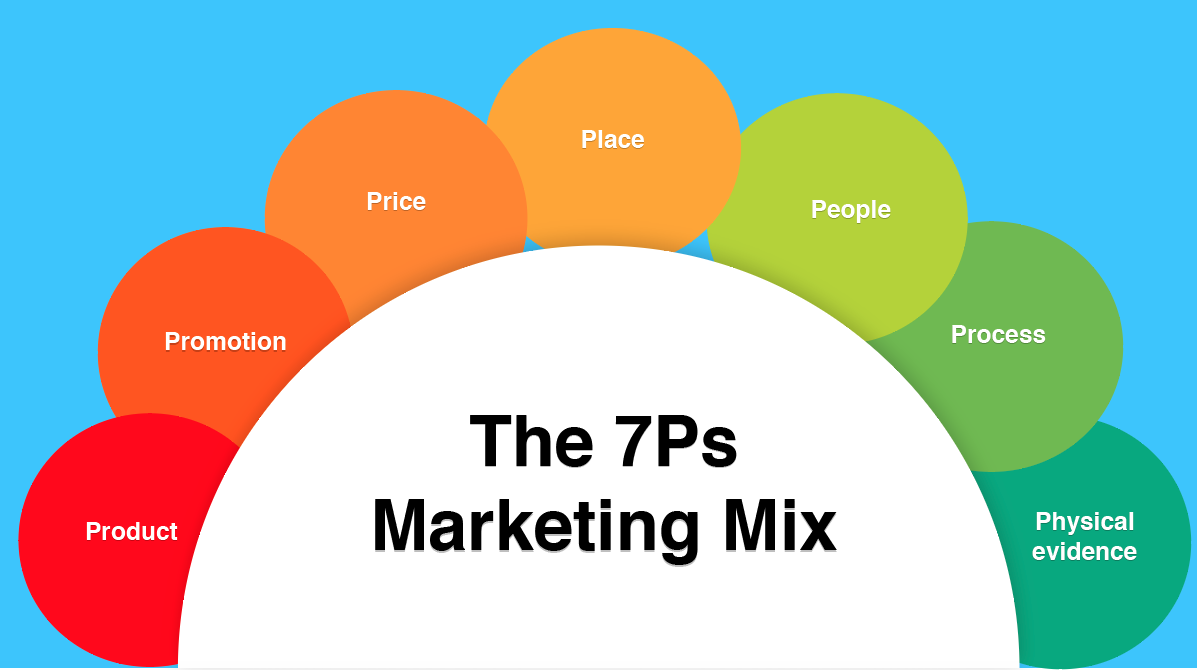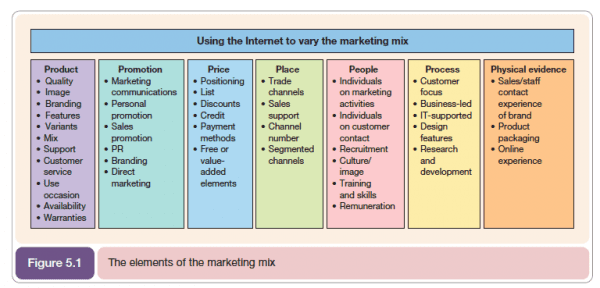
The 7Ps model was originally devised by E. Jerome McCarthy and published in 1960 in his book Basic Marketing. A Managerial Approach.
We’ve created the graphic below so you can see the key elements of the 7Ps marketing mix.
The 4Ps vs The 7Ps
The 4Ps were designed at a time where businesses were more likely to sell products, rather than services and the role of customer service in helping brand development wasn’t so well know. Over time, Booms and Pitner added three extended ‘service mix P’s’: Participants, Physical evidence and Processes, and later Participants was renamed People. Today, it’s recommended that the full 7Ps of the marketing mix are considered when reviewing competitive strategies.
The 7Ps helps companies to review and define key issues that affect the marketing of its products and services and is often now referred to as the 7Ps framework for the digital marketing mix.
In Dave Chaffey’s book: Digital Marketing: Strategy, Implementation and Practice, this model was refreshed and applied to online channels to give a practical approach which works well for multichannel businesses. An eighth P, ‘Partners’ is often recommended for businesses to gain reach online (first mentioned in Digital mMarketing Excellence by Dave Chaffey and PR Smith although some would argue it’s part of Place).
How can I use this model?
Although it’s sometimes viewed as dated, we believe the 4Ps are an essential strategy tool to select their scope and is particularly useful for small businesses. For startups reviewing price and revenue models today, using the Business Model Canvas for marketing strategy is a great alternative since it gives you a good structure to follow.
Companies can also use the 7Ps model to set objectives, conduct a SWOT analysis and undertake competitive analysis. It’s a practical framework to evaluate an existing business and work through appropriate approaches whilst evaluating the mix element as shown below and ask yourself the following questions:
- Products/Services: How can you develop your products or services?
- Prices/Fees: How can we change our pricing model?
- Place/Access: What new distribution options are there for customers to experience our product, e.g. online, in-store, mobile etc.
- Promotion: How can we add to or substitute the combination within paid, owned and earned media channels?
- Physical Evidence: How we reassure our customers, e.g. impressive buildings, well-trained staff, great website?
- People: Who are our people and are there skills gaps?
- Partners: Are we seeking new partners and managing existing partners well?.
An example of a company using the 7Ps strategy
Take a look at HubSpot as an example, which was founded in 2006; Hubspot has 8,000+ customers in 56 countries and sells software. What does their marketing mix look like?
This is a top level overview; you would take this into greater detail and ask the following questions:
1. Products/Services: Integrated toolset for SEO, blogging, social media, website, email and lead intelligence tools.
2. Prices/Fees: Subscription-based monthly, Software-As-Service model based on number of contacts in database and number of users of the service.
3. Place/Access: Online! Network of Partners, Country User Groups.
4. Promotion: Directors speak at events, webinars, useful guides that are amplified by SEO and effective with SEO. PPC Social media advertising, e.g. LinkedIn.
5. Physical Evidence: Consistent branding across communications.
6. Processes: More sales staff are now involved in conversion.
7: People: Investment in online services.
8. Partners: Hubspot looks to form partnerships with major media companies such as Facebook and Google plus local partners including Smart Insights who it is collaborating with on research in Europe.
What to watch for
When using the 7Ps as a model to conduct a marketing audit, I look at each of the Ps. It’s unwise to ignore an area unless it is completely outside your control.
Original References and sources of 7Ps?
Bitner, M. J. and Booms, H. (1981). Marketing Strategies and Organization: Structure for Service Firms. In Donnelly, J. H. and George, W. R. (Eds). Marketing of Services, Conference Proceedings. Chicago, IL. American Marketing Association. p. 47- 52.
McCarthy, E. J. (1964). Basic Marketing. Richard D. Irwin. Homewood, IL.
REF : Smart insights

